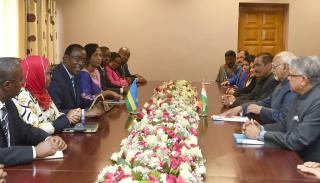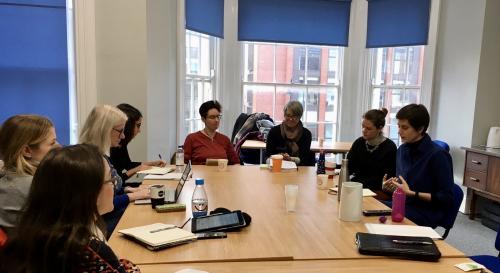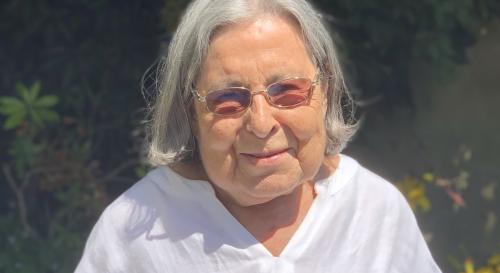
Breadcrumbs navigation
Can the Global South shape international norms through the appointment of leaders who implement these norms in peace operations?
International organisations reflect global power configurations and as such, are deemed to reproduce global inequalities. Nevertheless, they also represent opportunities for the Global South to challenge the global stratification of power, for instance by providing personnel to international agencies and bureaucracies. In their article for Review of International Studies (RIS) - Whose rules? Whose power? The Global South and the possibility to shape international peacekeeping norms through leadership appointments - Christoph Harig and Nicole Jenne examine the role of leadership personnel from the Global South in implementing robust peacekeeping mandates. Here they summarise the key points.
Great powers and states from the “Global North” dominate decision-making processes and are overrepresented in the bureaucracy of the United Nations (UN). As such, they tend to control the development of norms that guide global governance. Our article aims to find out if leadership appointments can afford less influential states the opportunity to challenge this dominance. We thus ask if individuals in prominent positions are able to contest and implement norms according to their respective state’s preferences.
Our study analyses the case of the norm on the use of force in peacekeeping, which has evolved over the past decades to become more permissive. Generally speaking, countries in the Global South have been cautious about the use of force in international politics. Although they supported the trend to more forceful peace operations at the UN, many have remained sceptical of what they see as enforcement practices that sit uneasily with the peacekeeping principles of minimum use of force, consent and impartiality. Providing mission leadership personnel who may delay or even hinder the implementation of offensive mandates can thus be an attractive way for force-adverse states to influence the underlying norms on the use of force.
By analysing the behaviour of leaders of the military component of UN peace operations, we thus use a micro-level perspective on the implementation and contestation of norms in order to answer our research question. As force commanders have to interpret vaguely defined mandates of peace operations and decide about the levels of coercion to be applied, they are crucial for implementing changing peacekeeping norms. Yet, our research shows that the possibilities to influence mandates through implementation on the ground are limited when a state’s preferences are clearly opposed to those of the UN. As long as there is broad convergence between preferences, however, there is room for mission leaders to advance particular interpretations of the mandate.
To see whether leadership appointments effectively serve states to promote their preferences in UN peace missions, we analysed the actions of force commanders from three countries of the Global South with different policy preferences regarding the use of force: Brazil, India and Rwanda. Naturally, how these leaders behave and act depends on their personal background: career experiences in the country they were trained and individual character traits shaped by their socio-political and cultural backgrounds. In other words, although peace operations leadership personnel are employed by the UN, their national background matters.
Were the decisions on the use of force taken by force commanders in line with their home countries’ foreign policy preferences? We differentiate between determined implementers, reluctant implementers and non-implementers of forceful norms. In the case of Brazil, one would expect Brazilian force commanders to act as reluctant norm implementers given that the country has traditionally been highly sceptical regarding the use of force in peace operations and that is has tried to exercise influence by proposing alternatives to intervention norms developed by Western states. However, the two force commanders analysed departed from Brazilian traditional foreign policy principles and used force in an offensive way. In these cases, power relations within the UN and pressure by powerful states ensured leaders would act in line with a robust interpretation of the mandate and against the preference of Brazil.
India, like Brazil, has remained critical of more permissive forms of coercive peacekeeping. But unlike in the Brazilian case, the Indian force commander whose actions we took under closer scrutiny behaved according to the expectation that he would only reluctantly enforce robust peacekeeping. Despite coming under pressure from the UN, the force commander implemented the mandate in line with India’s policy preferences rather consistently. India is the only case amongst those examined in our study in which a leadership appointment offered some possibilities of norm contestation. The fact that at the end of the Indian force commander's tenure, the UN chose to personally invite a Brazilian force commander whom they expected to interpret the offensive mandate of the Stabilisation Mission in the DR Congo (MONUSCO) according to their wishes, further demonstrates that leadership appointments only allow limited leeway in the contestation of norms.
Rwanda is a different case of a state located in the Global South which has supported and even spearheaded initiatives to raise the military profile of peace operations. Since the 1993–4 genocide the Rwandan government understands it as its moral mandate to protect civilians, if necessary, through the offensive use of force. Rwandan force commanders may therefore be expected to act as determined norm enforces, a prediction our analysis confirmed. Yet, the analysis also suggests that Rwandan leaders’ acting in line with the preferences of their home country’s government should not be seen as merely an expression of political loyalty to the government and the ruling party, as Rwanda’s civil-military amalgamation suggests. Instead, the two force commanders analyzed have military careers including combat experience that have likely influenced how they dealt with the issue of force.
Which conclusions can be drawn from the case studies? Coveted leadership appointments in peace operations may serve governments from less powerful states that are excluded from formulating international norms at the level of decision-making to contest norms at the implementation level. However, this potential for norm contestation is limited. Individual leaders are most likely to have influence in the implementation of norms when governments’ preferences are broadly in line with the dominant ones at the UN. In this case, leaders may find considerable room of maneuver to interpret the details of typically vague mission mandates according to their own understanding and choice. However, in case of clashing understandings of norms power dynamics within the UN and pressure by more powerful states will most likely constrain either the action or even the appointment of leadership personnel that may contest the dominant interpretation of a norm. In sum, our findings highlight that possibilities to contest norms at the level of implementation remain constrained by power dynamics in global politics.
Want to know more? You can read Christoph and Nicole's full article at DOI: https://doi.org/10.1017/S0260210522000262
This particular article is open access, however BISA members receive access to RIS (and to our other journal European Journal of International Security) as a benefit of membership. To gain access, log in to your BISA account and scroll down to the 'Membership benefits' section. If you're not yet a member join today.
The top image is a copyrighted work of the Government of India, licensed under the Government Open Data License - India (GODL)


